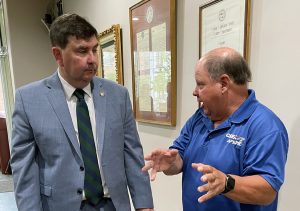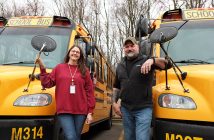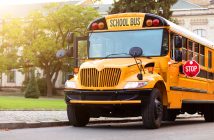Our union’s Special Local Government Schools Committee serves as a vital voice for CSEA members employed at schools across the state.
CSEA Special Local Government Schools Committee Chair John Brown, also the Oneida Educational Employees Local President, noted that committee members are focused on helping solve the pressing issues schools face.
“We’ve got the whole state covered,” said Brown, who is also Holland-Patent School District Local President. “Everyone brings a different experience to the table. Everyone’s doing their part.”
One of the committee’s top priorities is reviving its newsletter to keep members informed about new regulations and challenges. The committee is also tackling the upcoming renewal of workplace violence prevention plans, something many districts still haven’t fully addressed.
Brown sees the group’s collaborative spirit as its strength.
“What makes this committee great is that everyone’s willing to speak up, share what’s working and be honest about what isn’t,” said Brown. “That’s how we move forward.”
Driver shortage leading to stress
One issue continues to create daily disruptions across the state: the school bus driver shortage.
“Look at the bus driver problem—we’ve been talking about this for years,” said Brown. “And now we’re seeing the consequences.”
Districts are consolidating routes, including having kindergartners and high schoolers ride together. In some areas, parents have resorted to driving their kids themselves.
“I wouldn’t want my third grader sitting next to a high school junior on the bus,” said Brown.
The disparity in pay rates across districts only makes things worse.
“One district pays $30 an hour, another pays $21,” said Brown. “That’s a huge difference, and drivers will jump ship for a buck more an hour. You lose continuity, you lose trust and kids suffer.”
Retirees make up a large portion of the current driver workforce, and recruitment has been slowed by both low pay and burdensome testing requirements. CSEA successfully advocated for the removal of “under the hood” requirement, which required drivers to inspect the bus engine before trips.
“We’ve tried job fairs and driver rodeos,” said Brown. “It helps, but the real problem is how we value this job.”
Beyond driving, bus drivers often unofficially serve as counselors and nurses.
“They’re the first and last school employee a kid sees every day,” said Brown. “They know the kids. That connection matters.”

From left, now U.S. Rep. John Mannion, a former teacher, listens as John Brown speaks about issues facing school workers.
Federal cuts harming schools
Looming federal funding cuts—especially to Medicaid—are threatening the future of school services, particularly for vulnerable students.
“People don’t realize how much of our school services are tied to federal dollars,” Brown said. “Medicaid supports special education, pre-K and even the staff who process all the paperwork. If those funds disappear, those jobs go, and kids lose out.”
School lunch programs, which often provide the only full meals many students get in a day, are also at risk.
“We’re feeding kids well into the summer now,” said Brown. “Take away that funding, and we’re also taking away their ability to learn. Even if you wanted to raise taxes, it may [be difficult]to cover what’s being cut. And who suffers? The kids—and the support staff.”
Brown emphasized that political action is more important than ever, encouraging members to attend meetings, track budget votes and be visible in their communities.
“People think political action means holding a sign on a picket line, but it’s not just that,” said Brown. “It’s showing up to a school board meeting, knowing what’s on the agenda and having a presence. If 95% of our membership lives in the district, we have real influence. We just have to use it.”
Support staff essential
Brown noted that the committee’s message is that school support staff are essential.
“We ask these people to care for our kids, maintain millions of dollars in infrastructure, and be the backbone of the school community, yet we try to pay them like fast-food workers,” said Brown. “That’s not sustainable.”
Whether it’s advocating for maintenance staff who plow through winter storms, or nurses who manage complex medical needs, Brown said he wants administrators and lawmakers to recognize the value of school employees.
“Everything we do is for the kids. That’s why we’re in this business,” said Brown. “But if we don’t fix these problems now with transportation, funding and staffing, then the ones who lose out aren’t just the workers. It’s the students.”
— Nicholas Newcomb





